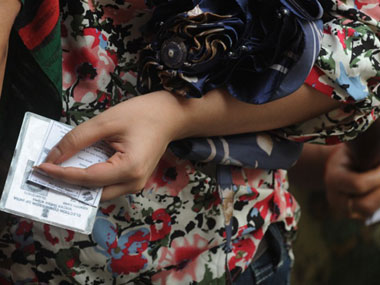The Gujarat bill providing for compulsory voting and 50 percent reservation for women in local bodies, a 2009 legislation that was recently okayed for enactment by the state Governor, may have to be diluted or delayed. Not because of the loud din raised by so-called “liberals”, but because it is one of those well-intentioned laws that have not been thought through right to the last mile of implementation. The liberal argument against the bill is tosh. It is worth debunking. The same people who welcomed the Nota — none of the above — button in EVM machines are now saying that genuine democratic freedom includes the right to not vote at all. I don’t believe there is any fundamental rights issue at stake here. When you sign up as a citizen of a democratic state, you get some fundamental rights, but simultaneously you also sign up to follow the laws that this state legislates on your behalf. If you don’t agree, you can debate it before a proposal becomes law, you can lobby your legislators to vote against it, and if it is still becomes law, you can go to court to check its constitutionality. This option is open to critics even now. [caption id=“attachment_1799673” align=“alignleft” width=“380”]  Representational image. AFP[/caption] In my view, requiring a citizen to vote (when she is able to) is not an unreasonable infringement of her rights. Laws that encroach even more on individual rights - the right to freedom of expression, the right to property, the right to not share your biometrics and the right to settle in all parts of India – have all been legislated and implemented, and often upheld by courts. As opposed to this, the requirement that you must vote in a democracy is not something unacceptable. The criticism I find valid is that the state has not thought through the consequences of the law and how it will be implemented. A delay would be useful so that these details can be worked out, but there is no reason to abandon the law altogether. It should be seen as a pilot — an experiment — to see if it delivers a better democracy over time. An apathetic electorate will ultimately get a tyrannical government. So experiments in deepening democracy are worth trying out. A Guardian story some years back listed more than 30 countries, most of them genuine democracies (ie, not of the North Korean kind), having some form of compulsory voting or the other. Belgium, it seems, had had it since 1892, and the Belgians — who fight about everything from language to devolution of power — have not found this idea worth protesting about. However, this does not mean the Gujarat government should rush to implement the idea. It should first ask itself the right questions and find solutions to them. #1: How will it track voters who still don’t vote and how will it assess their reasons for not voting if, say, very large numbers don’t participate initially. If the excuses of a million people have to be examined for their validity, will it not lead to corruption, and huge bureaucratic screw-ups in this exercise? #2: What kind of penalties will be imposed for not voting? If, say, it is a cash fine, how will it be collected from, say, a million poor people? Will it not lead to disgruntlement and a political backlash? In Belgium, the penalties, according to The Guardian article of 2005, range from a small fine to something more dangerous. If you miss four votes, you may be disenfranchised for 10 years. And you may find yourself ineligible for public sector jobs. Gujarat clearly should avoid these extremes. #3: To avoid a mess-up, has the state thought of how it is going to familiarise the people with what they are expected to do and ensure their buy-in? A massive exercise like this should never be undertaken without prolonged public education. #4: Has the state thought of making voting as easy as, say, paying a credit card bill? Should it hold the law it is fully wired and e-voting with foolproof identification is possible? If NRIs can e-vote in future, why not panchayat voters? I suspect that a lot of the non-voters stay away because registration is often a hassle for city dwellers who keep moving residences, and also because they simply don’t want to waste time at polling booths on a particular day. I believe the liberals are wrong to believe that we have so many conscientious non-voters who have thought through their decision against voting. Ask yourself: if the Election Commission were to bring an EVM machine to your door, would you still not do so? (This is what e-voting will ultimately enable). If you will vote in this case, it means you are not someone exercising your right to not vote. You are either lazy or too busy. A mandatory law is meant to deal with these situations. #5: Has Gujarat thought of doing a few pilots before extending the law to the whole state? Experimenting with compulsory voting in, say, two districts (one urban, one rural) would enable the government and the Election Commission to figure out the logistical issues that will crop up and find solutions. Detailed discussions with the implementing agencies and the state bureaucracy are vital if the law is not to end up in a fiasco. Overall, I would say that India needs to launch a thousand experiments with improving its democracy — and this can’t happen if we shout down every innovation even before it is tried out. We have too many naysayers and too few doers. Now, consider the benefits of compulsory voting. One, larger participation means a greater legitimacy for elected leaders. In the last Lok Sabha election, some critics of Modi said he had only 31 percent of the vote, and hence his mandate is not real. If 100 percent (or even 80-90 percent) of the eligible voters had voted, even a 31 percent share would have been a massive mandate. Two, compulsory voting shifts the onus for ensuring participation to the state. Consider what could be happening now: some disadvantaged groups (say tribals or Dalits or women) could be intimidated into not voting. With compulsory voting, the state would be held responsible for allowing this to happen. Three, good democratic habits are learnt, not inborn. When the law forces you to do the right thing, and if it is sensibly implemented, over time you internalise a good habit. Just as we have learnt to not drink and drive, and hopefully we will learn not to urinate or defecate in public in future, social push has to be backed with law and effective enforcement. The simple point: mandatory voting is an idea worth trying out. But it needs to be tested and then scaled up till it becomes second nature to us.
Deepening democracy needs an openness to try out new ways to get people to participate. Compulsory voting is one such way, and it needs to be tested and tried before being rejected as an option
Advertisement
End of Article
Written by R Jagannathan
R Jagannathan is the Editor-in-Chief of Firstpost. see more


)

)
)
)
)
)
)
)
)



